英语中不需要冠词
不用冠词的几种情况
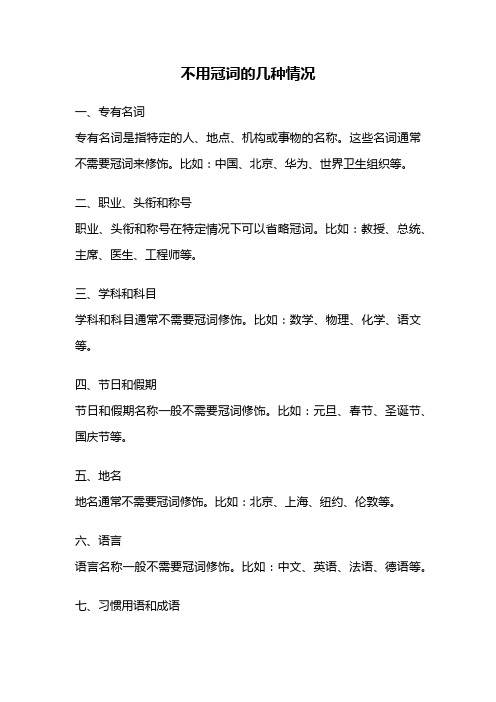
不用冠词的几种情况
一、专有名词
专有名词是指特定的人、地点、机构或事物的名称。
这些名词通常不需要冠词来修饰。
比如:中国、北京、华为、世界卫生组织等。
二、职业、头衔和称号
职业、头衔和称号在特定情况下可以省略冠词。
比如:教授、总统、主席、医生、工程师等。
三、学科和科目
学科和科目通常不需要冠词修饰。
比如:数学、物理、化学、语文等。
四、节日和假期
节日和假期名称一般不需要冠词修饰。
比如:元旦、春节、圣诞节、国庆节等。
五、地名
地名通常不需要冠词修饰。
比如:北京、上海、纽约、伦敦等。
六、语言
语言名称一般不需要冠词修饰。
比如:中文、英语、法语、德语等。
七、习惯用语和成语
习惯用语和成语中的名词通常不需要冠词修饰。
比如:心上人、路上人、吃饭穿衣等。
八、时间表达
时间表达中的星期、月份、季节等通常不需要冠词修饰。
比如:星期一、七月、夏天等。
九、序数词和基数词
序数词和基数词通常不需要冠词修饰。
比如:第一、十二、一百等。
十、部分漏掉冠词的固定短语
有些固定短语中的名词会省略冠词,例如:上学、下班、回家、去医院、上楼、下车等。
以上是一些常见的不用冠词的情况。
在使用时,我们需要根据具体的语境来判断是否需要使用冠词。
正确地使用冠词可以使语言更加准确、流畅。
希望以上内容对您有所帮助。
英语名词前不用冠词的各种情况

名词前不用冠词的各种情况(1)国家名和人名前通常不用冠词。
如:China is a very large country.中国是个大国。
Mary is my sister.玛丽是我妹妹。
(2)由“专有名词+普通名词”构成的专有名词前不用冠词。
如:Beijing Airport北京机场;Nanjing Road南京路;Zhongshan Park中山公园;Qinghua University清华大学;Tian'anmen Square天安门广场。
(3)泛指一类人或事物的复数名词前不用冠词。
如:Computers are very useful.电脑很有用。
Men are cleverer than monkeys.人比猴子聪明。
(4)man泛指人类时其前不用冠词。
如:Man cannot live without air or water.没有空气和水人就不能生存。
(5)不是特指的物质名词或抽象名词前不用冠词。
如:Money is not everything.金钱不是万能的。
Music can bring pleasure to people.音乐能给人带来欢乐。
(6)名词前已有指示代词this,that,these,those和物主代词my,your,his,her,our,their,its或不定代词some,any,no,each,every等作定语时不用任何冠词。
如:My pen is much more expensive than yours.我的钢笔比你的贵多了。
Don't touch that stone.It's dangerous.不要动那块石头。
它很危险。
(7)表示季节、月份、星期的名词前一般不用冠词。
如:He was born on February 18,2005.他出生在2005年2月18日。
They usually plant trees on the hills in spring.春天他们通常在山上植树。
英语语法中哪些情况下可以不用冠词
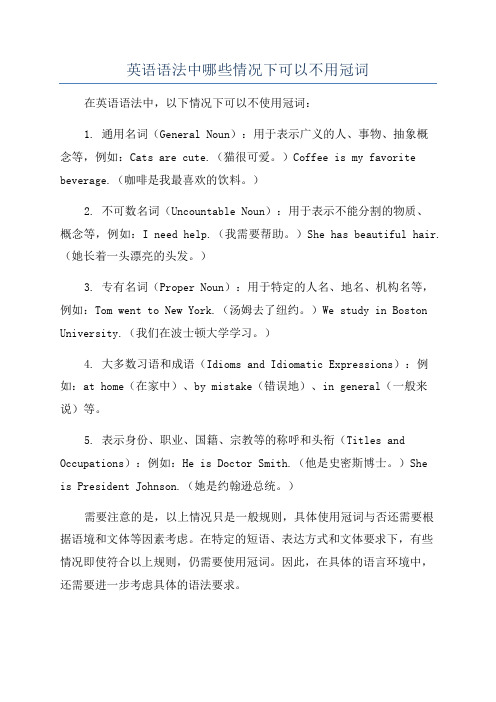
英语语法中哪些情况下可以不用冠词
在英语语法中,以下情况下可以不使用冠词:
1. 通用名词(General Noun):用于表示广义的人、事物、抽象概
念等,例如:Cats are cute.(猫很可爱。
)Coffee is my favorite beverage.(咖啡是我最喜欢的饮料。
)
2. 不可数名词(Uncountable Noun):用于表示不能分割的物质、
概念等,例如:I need help.(我需要帮助。
)She has beautiful hair.(她长着一头漂亮的头发。
)
3. 专有名词(Proper Noun):用于特定的人名、地名、机构名等,例如:Tom went to New York.(汤姆去了纽约。
)We study in Boston University.(我们在波士顿大学学习。
)
4. 大多数习语和成语(Idioms and Idiomatic Expressions):例如:at home(在家中)、by mistake(错误地)、in general(一般来说)等。
5. 表示身份、职业、国籍、宗教等的称呼和头衔(Titles and Occupations):例如:He is Doctor Smith.(他是史密斯博士。
)She is President Johnson.(她是约翰逊总统。
)
需要注意的是,以上情况只是一般规则,具体使用冠词与否还需要根据语境和文体等因素考虑。
在特定的短语、表达方式和文体要求下,有些情况即使符合以上规则,仍需要使用冠词。
因此,在具体的语言环境中,还需要进一步考虑具体的语法要求。
不用冠词的情况

什么情况下不用英语“冠词”作者:网编整理来源:新东方论坛时间:2013-12-09在冠词的学习过程中,什么情况下使用冠词,什么情况下不使用冠词,我们都很熟悉。
但下列不使用冠词的情况我们需特别注意。
1. 表示头衔、职务、职称、身份等的名词,在句中作表语、宾(主)补时,该名词常不与冠词连用。
如:Lincoln became President of the United States. 林肯成为美国总统。
Li Ming was made monitor of our class. 李明被选为我们班的班长。
2. turn作为系动词,且当"变成"解时,其后的表语若为单数可数名词,一般不用冠词。
如:His brother turned thief. 他哥哥成了小偷。
对比:His brother became a thief.但作表语的名词前有形容词修饰时,则该名词前常有不定冠词。
如:His brother turned a great inventor. 他哥哥成了一位伟大的发明家。
3. 书名、标题前一般不用冠词。
如:Do you have "From Earth to Moon"? 你有《从地球到月亮》这本书吗?Have you read "Oliver Twist"? 你读过《雾都孤儿》吗?4. 以as,though引导的让步状语从句,名词放于句首时,该名词前常不用冠词。
如:Child as he is,he knows a lot about it.尽管他是小孩,但这件事他知道很多。
Girl though she was,she dared to face the enemy. 尽管她是女孩,但她敢面对敌人。
5. man,woman表泛指时,常不用冠词,且用单数形式。
如:Man will change nature. 人类将会改变自然。
Man tries to be a protector of woman.男人试图做女人的保护者。
哪些情况下不用冠词a、an、the
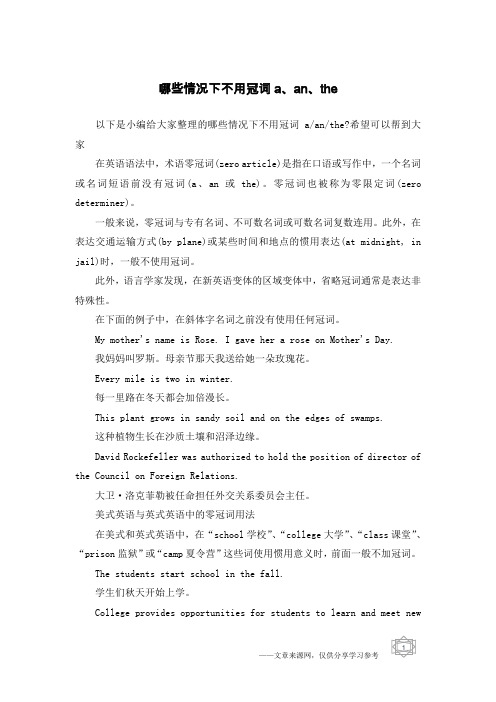
哪些情况下不用冠词a、an、the以下是小编给大家整理的哪些情况下不用冠词a/an/the?希望可以帮到大家在英语语法中,术语零冠词(zero article)是指在口语或写作中,一个名词或名词短语前没有冠词(a、an或the)。
零冠词也被称为零限定词(zero determiner)。
一般来说,零冠词与专有名词、不可数名词或可数名词复数连用。
此外,在表达交通运输方式(by plane)或某些时间和地点的惯用表达(at midnight, in jail)时,一般不使用冠词。
此外,语言学家发现,在新英语变体的区域变体中,省略冠词通常是表达非特殊性。
在下面的例子中,在斜体字名词之前没有使用任何冠词。
My mother's name is Rose. I gave her a rose on Mother's Day.我妈妈叫罗斯。
母亲节那天我送给她一朵玫瑰花。
Every mile is two in winter.每一里路在冬天都会加倍漫长。
This plant grows in sandy soil and on the edges of swamps.这种植物生长在沙质土壤和沼泽边缘。
David Rockefeller was authorized to hold the position of director of the Council on Foreign Relations.大卫·洛克菲勒被任命担任外交关系委员会主任。
美式英语与英式英语中的零冠词用法在美式和英式英语中,在“school学校”、“college大学”、“class课堂”、“prison监狱”或“camp夏令营”这些词使用惯用意义时,前面一般不加冠词。
The students start school in the fall.学生们秋天开始上学。
College provides opportunities for students to learn and meet newpeople.大学为学生们提供学习和结识新人的机会。
冠词与不定冠词的用法区分
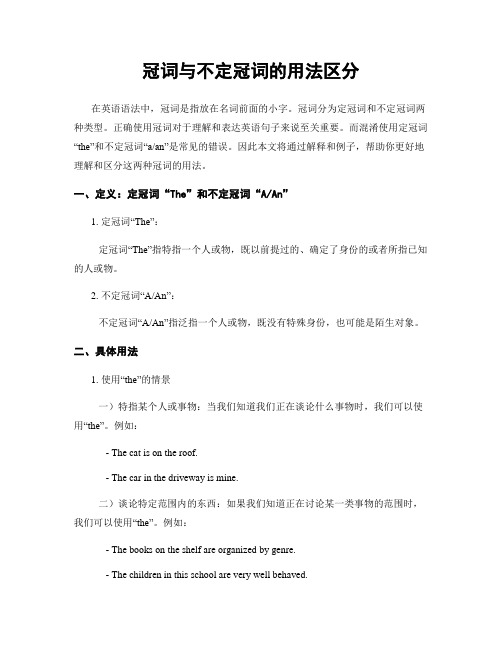
冠词与不定冠词的用法区分在英语语法中,冠词是指放在名词前面的小字。
冠词分为定冠词和不定冠词两种类型。
正确使用冠词对于理解和表达英语句子来说至关重要。
而混淆使用定冠词“the”和不定冠词“a/an”是常见的错误。
因此本文将通过解释和例子,帮助你更好地理解和区分这两种冠词的用法。
一、定义:定冠词“The”和不定冠词“A/An”1. 定冠词“The”:定冠词“The”指特指一个人或物,既以前提过的、确定了身份的或者所指已知的人或物。
2. 不定冠词“A/An”:不定冠词“A/An”指泛指一个人或物,既没有特殊身份,也可能是陌生对象。
二、具体用法1. 使用“the”的情景一)特指某个人或事物:当我们知道我们正在谈论什么事物时,我们可以使用“the”。
例如:- The cat is on the roof.- The car in the driveway is mine.二)谈论特定范围内的东西:如果我们知道正在讨论某一类事物的范围时,我们可以使用“the”。
例如:- The books on the shelf are organized by genre.- The children in this school are very well behaved.三)表示人和事物的独特性:使用“the”来表示唯一、已知或特定的事物。
例如:- I watched the movie you recommended.- The Eiffel Tower is located in Paris.2. 使用“a/an”的情景一)泛指未具体确定的人或物:使用“a/an”来指代没有特殊身份的事物。
例如:- I saw a dog on my way to work.- An elephant is a large animal.二)谈论某个职业或身份:使用“a/an”来表示某个职业或身份类别中的人。
例如:- She is an artist.- He wants to be a doctor when he grows up.三)排除其他事物时使用:“another”的否定形式是“not another”,用于避免重复。
不加定冠词the的用法口诀

不加定冠词the的用法口诀一、加上却离不开的场合所谓"不加定冠词th e的用法口诀",指的是英语中有些情况下,名词前并不需要加上定冠词"th e"。
这些情况主要包括:1.泛指的场合:当我们讨论某种事物的一般情况时,不加定冠词。
例如:Ih at es pi de rs.(我讨厌蜘蛛。
)2.饮食、学科或娱乐活动等抽象概念:当我们提及饮食(b re ak fa s t、l u nc h、di nn er)、学科(ma th em at ic s、h is to ry、c hem i st ry)或娱乐活动(p la yi ngb a sk et ba ll、g oi ng s wi mm in g)时,不加定冠词。
例如:I lo ve pl ay in g ba sk et ba ll.(我喜欢打篮球。
)二、指特定一类事物的场合除了以上情况外,还存在一些特殊场合,当我们讨论某个特定类别的事物时,也不需要加上定冠词"t he"。
下面是一些常见的场合:1.专有名词:当我们讨论人名、国名、城市名、山脉名、河流名等专有名词时,不加定冠词。
例如:S he li ves i nP ar is.(她住在巴黎。
)2.某些表示身份、职位的名词:当我们使用身份或职位名词来描述某个人时,不加定冠词。
例如:He is at ea ch e r.(他是一名教师。
)3.语言和学科名称:当我们提到某种语言或学科时,不加定冠词。
例如:Sh es pe ak sE ngl i sh.(她说英语。
)4.某些节日和季节名称:当我们提及某个节日或季节时,不加定冠词。
例如:W ec el eb ra te C hr is tm as in De cem b er.(我们在十二月庆祝圣诞节。
)三、其他特殊用法除了以上规则外,还存在一些特殊的用法,需要我们特别注意:1.不加定冠词的特定表达方式:在某些特定的表达方式中,我们不需要加上定冠词。
名词前不用冠词的情况总结

名词前不用冠词的情况总结名词前不用冠词的情况英语中误用冠词的情况经常发生,为了避免同样的错误出现,现在把不需要冠词的场合列举如下,以作参考:㈠无特指意义的物质名词前不用冠词,如:1. Gold isprecious.2. Air is indispensable toanimals.3. Electricity is a form ofenergy.㈡无特指意义的抽象名词前不用冠词,如:4. Unity isstrength.5. Knowledge ispower.6. Samson is a man of bravery.㈢无特指意义的复数名词前不用冠词,如:7. Doctors cure patients.8. Axes are tools for cutting wood.9. Those people are teachers, not students.㈣有关餐食的名词前不用冠词,如:10. Dinner isready.11. After lunch, you may take a nap.12.What do you eat for breakfast?㈤有关四季的名词前不用冠词,如:13. I like autumnmost.14. Do you have to teach insummer?15. Winter is over; will spring be far away?㈥有关游戏和运动的名词前不用冠词,如:16. Fandi can play soccer very well.17. Do yo like to playchess?18. Is bridge a popular game here?㈦有关疾病的名词前不用冠词,如:19. Old People tend to suffer from diabetes.20.Many women are inflicted withrheumatism(['ru:m?tiz?m,'ru-]n. 风湿病).㈧有关学科或带“-ism”后缀的名词前不用冠词,如:21. Mathematics and physics are difficultsubjects.22. Which do you prefer, imperialism ([im'pi?ri?liz?m]n. 帝国主义,capitalistimperialism:资本帝国主义) or communism?㈨在“by + 交通工具”的片语里名词前不用冠词,如:23. Shall we walk or go bybus?24. The tourists came byplane.25. Do you like to travel by land or by sea?㈩关于“人、节日、地理、建筑物、语言”等的专有名词前不用冠词,如:26. Tony wants to seeSusan.27. Christmas is a widely celebratedfestival.28. Europe is more advanced thanAfrica.29. Do you know where Buckingham Palaceis?30.Is Japanese similiar to Chinese?上述是无须冠词的例句,但当专有名词之前有修饰语时,可以用定冠词(例(31)-(32));当抽象名词被形容词、短语或分句修饰时,也可以有适当的冠词(例(33)-(36)):31. Caesar was an ancient hero. Do you admire the great Caesar andhisdeeds?32. We enjoy reading the great works written by the immortal([i'm?:t?l]adj.不朽的;神仙的;长生的)Shakespeare.33. A little knowledge is a dangerousthing.34. The wisdom of Solomon was recorded inhistory.35. Tom showed a courage worthy of specialmention.36. I find it hard to forget the generosity with which David treated me.。
使用零冠词的八种情况

使用零冠词的八种情况在英语中,冠词是用来限定名词的,表示名词的种类。
冠词有定冠词(the)和不定冠词(a/an)两种。
然而,在某些情况下,我们不需要使用冠词,这被称为“零冠词”的情况。
以下是使用零冠词的八种常见情况:抽象名词前:抽象名词,如advice、information、knowledge等,通常不使用冠词。
例如:I need some advice.The information is very useful.物质名词前:表示物质或材料的名词,如gold、silver、wood等,通常也不使用冠词。
例如:Gold is a precious metal.The table is made of wood.不可数名词前:当名词被看作是不可数时,不使用冠词。
例如:I like coffee.There is milk in the fridge.名词前已有其他限定词:当名词前已经有其他限定词,如指示代词(this, that, these, those)、所有格代词(my, your, his, her等)或数词时,通常不使用冠词。
例如:This book is mine.Those shoes are hers.表示泛指的人或事物:在某些情况下,当我们想要表示一个泛指的概念,而不是一个特定的实例时,我们可能会使用零冠词。
例如:Man cannot live without water.Children love to play.在介词之后:当名词用作介词宾语时,通常不使用冠词。
例如:She is looking for a job in education.I have a friend from France.在表语位置:当名词用作表语,表示主语的职业或身份时,通常不使用冠词。
例如:My brother is a teacher.She is a nurse.在并列名词中:当两个或更多的名词并列时,通常只在第一个名词前使用冠词,其他名词前使用零冠词。
不用冠词的场合有哪些

不用冠词的场合有哪些冠词是用在名词前面,帮助说明名词所指的人或事物的词语,在英语中,有些场合是不需要加冠词的。
小编为大家力荐了不用冠词的场合,给大家作为参考,欢迎阅读!不用冠词的场合①抽象、物质名词和专有名词一般无冠词,但物质名词、抽象名词具体化,或专有名词泛指时,常用不定冠词,例:a Mr Wang/a climb/a swim.for a while/in a hurry/a fire Here is a life of struggle.Physics is a science. There was a heavy rain last night.等抽象名词受of短语修饰或上下文已予限定,用the.如:the science of speech sounds 语音学the music of the film, do me the favor to do sth.②代数词、基数词作前置定词,不用冠词。
③泛指的节假日、季节、星期前不用冠词。
但是季节名词表特定时间或受of知识修饰时用the.如:in the winter of 1948。
有时泛指时间用a+adj+名词。
如:have a hot summer.④餐名前一般无冠词。
但餐名受adj修饰时常常有a(an).特指时用the.如:have a good supper. The breakfast was well cooked.dinner表“宴会”时,是可数名词,有各种冠词修饰give a dinner to them.⑤普通名词并列时不用冠词soul and heart/husband and wife/day after day/arm in arm/hand in hand.⑥语种前不用冠词。
但the English结构用the。
What's the English for labour.The English of shakespear.作限定时用the.不用冠词的语法顺口溜抽象、物质、专有名,代词基数用作限定;泛指节假季节星期几,球棋、呼语与餐名;刊物、公告与标题,普通名词并列紧相邻;唯一职位,学科与语种,洲、国、省、市、县街路名。
英语中冠词的用法归纳总结
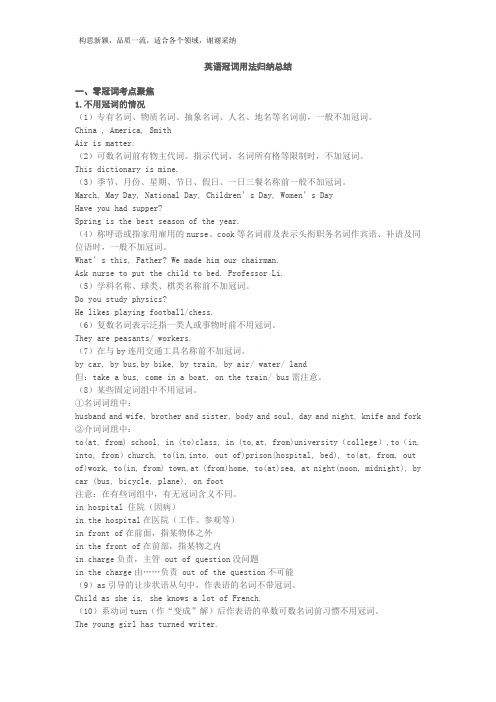
英语冠词用法归纳总结一、零冠词考点聚焦1.不用冠词的情况(1)专有名词、物质名词、抽象名词、人名、地名等名词前,一般不加冠词。
China , America, SmithAir is matter.(2)可数名词前有物主代词、指示代词、名词所有格等限制时,不加冠词。
This dictionary is mine.(3)季节、月份、星期、节日、假日、一日三餐名称前一般不加冠词。
March, May Day, National Day, Children’s Day, Women’s DayHave you had supper?Spring is the best season of the year.(4)称呼语或指家用雇用的nurse、cook等名词前及表示头衔职务名词作宾语、补语及同位语时,一般不加冠词。
What’s this, Father? We made him our chairman.Ask nurse to put the child to bed. Professor Li.(5)学科名称、球类、棋类名称前不加冠词。
Do you study physics?He likes playing football/chess.(6)复数名词表示泛指一类人或事物时前不用冠词。
They are peasants/ workers.(7)在与by连用交通工具名称前不加冠词。
by car, by bus,by bike, by train, by air/ water/ land但:take a bus, come in a boat, on the train/ bus需注意。
(8)某些固定词组中不用冠词。
①名词词组中:husband and wife, brother and sister, body and soul, day and night, knife and fork ②介词词组中:to(at, from) school, in (to)class, in (to,at, from)university(college),to(in, into, from)church, to(in,into, out of)prison(hospital, bed), to(at, from, out of)work, to(in, from) town,at (from)home, to(at)sea, at night(noon, midnight), by car (bus, bicycle, plane), on foot注意:在有些词组中,有无冠词含义不同。
冠词动词的用法口诀英语用法

冠词动词的用法口诀英语用法
1.不需要冠词的情况:
- 泛指行为或状态:Water boils at 100 degrees Celsius.(水在100度时沸腾。
)
- 表示习惯行为的动词:I play tennis every Sunday.(我每周日打网球。
)
- 表示真理或普遍事实的动词:The sun rises in the east.(太阳从东方升起。
)
2. 需要定冠词 "the" 的情况:
- 表示特指的情况:I watched the movie last night.(昨晚我看了那部电影。
)
- 特指其中一类事物:I love the sea.(我喜欢大海。
)
- 表示超级级别:She is the best singer in the world.(她是世界上最好的歌手。
)
3. 需要不定冠词 "a" 或 "an" 的情况:
- 表示单数可数名词的泛指:I saw a car on the street.(我在街上看到了一辆车。
)
- 表示职业、国籍、信仰等身份的人:He is an architect.(他是一位建筑师。
)
- 表示一些人或物的特指:I need an apple.(我需要一个苹果。
4.需要零冠词(没有冠词)的情况:
- 表示抽象名词、不可数名词或复数名词泛指:Love is important.(爱很重要。
)
- 用于表示特殊用途的名词:She went to school by bus.(她乘公交车去学校。
英语中冠词的用法归纳总结
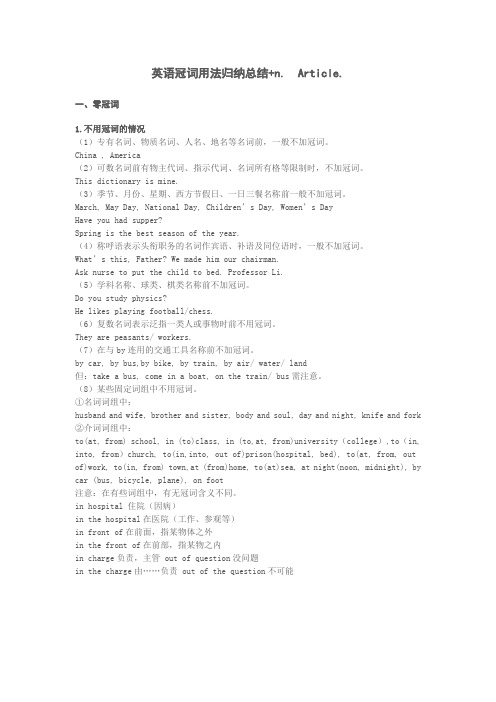
英语冠词用法归纳总结+n. Article.一、零冠词1.不用冠词的情况(1)专有名词、物质名词、人名、地名等名词前,一般不加冠词。
China , America(2)可数名词前有物主代词、指示代词、名词所有格等限制时,不加冠词。
This dictionary is mine.(3)季节、月份、星期、西方节假日、一日三餐名称前一般不加冠词。
March, May Day, National Day, Children’s Day, Women’s DayHave you had supper?Spring is the best season of the year.(4)称呼语表示头衔职务的名词作宾语、补语及同位语时,一般不加冠词。
What’s this, Father? We made him our chairman.Ask nurse to put the child to bed. Professor Li.(5)学科名称、球类、棋类名称前不加冠词。
Do you study physics?He likes playing football/chess.(6)复数名词表示泛指一类人或事物时前不用冠词。
They are peasants/ workers.(7)在与by连用的交通工具名称前不加冠词。
by car, by bus,by bike, by train, by air/ water/ land但:take a bus, come in a boat, on the train/ bus需注意。
(8)某些固定词组中不用冠词。
①名词词组中:husband and wife, brother and sister, body and soul, day and night, knife and fork ②介词词组中:to(at, from) school, in (to)class, in (to,at, from)university(college),to(in, into, from)church, to(in,into, out of)prison(hospital, bed), to(at, from, out of)work, to(in, from) town,at (from)home, to(at)sea, at night(noon, midnight), by car (bus, bicycle, plane), on foot注意:在有些词组中,有无冠词含义不同。
英语零冠词的用法总结

英语零冠词的用法总结
在英语中,零冠词(no articles)指的是没有名词性的词,通常用于形容词或副词。
以下是英语零冠词的用法总结:
1. 形容词或副词:在英语中,形容词或副词通常没有冠词,例如: - The book on the table is beautiful.(这艘桌子上的书很美丽。
)
- The sun is shining brightly.(太阳正灿烂地照耀着。
)
2. 量词和部分量词:在一些情况下,英语中的量词和部分量词没有冠词,例如:
- A piece of cake:一个问题不大。
- A few drops of water:一点水滴。
3. 动词:在一些动词的用法中,有时也不使用冠词,例如:
- I enjoy playing soccer.(我喜欢踢足球。
)
- They eat breakfast in the morning.(他们在早上吃早餐。
) 虽然英语中不使用冠词来表示名词,但在日常交流中,人们通常
会在名词前面加上定冠词“the”来表示特定或泛指。
例如:
- The book on the table is mine.(这本书是我的。
)
- The car is的颜色是蓝色的。
(这辆车的颜色是蓝色的。
) 总之,零冠词是英语中最基本的名词形式,主要用于形容词和副词,以及一些量词和部分量词。
在日常使用中,可以根据上下文来选择使用或不使用冠词。
名词前不用冠词的15种情况
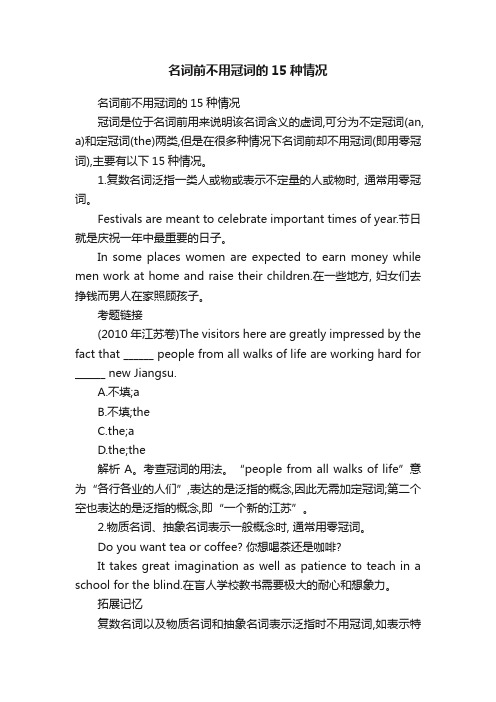
名词前不用冠词的15种情况名词前不用冠词的15种情况冠词是位于名词前用来说明该名词含义的虚词,可分为不定冠词(an, a)和定冠词(the)两类,但是在很多种情况下名词前却不用冠词(即用零冠词),主要有以下15种情况。
1.复数名词泛指一类人或物或表示不定量的人或物时, 通常用零冠词。
Festivals are meant to celebrate important times of year.节日就是庆祝一年中最重要的日子。
In some places women are expected to earn money while men work at home and raise their children.在一些地方, 妇女们去挣钱而男人在家照顾孩子。
考题链接(2010年江苏卷)The visitors here are greatly impressed by the fact that ______ people from all walks of life are working hard for ______ new Jiangsu.A.不填;aB.不填;theC.the;aD.the;the解析 A。
考查冠词的用法。
“people from all walks of life”意为“各行各业的人们”,表达的是泛指的概念,因此无需加定冠词;第二个空也表达的是泛指的概念,即“一个新的江苏”。
2.物质名词、抽象名词表示一般概念时, 通常用零冠词。
Do you want tea or coffee? 你想喝茶还是咖啡?It takes great imagination as well as patience to teach in a school for the blind.在盲人学校教书需要极大的耐心和想象力。
拓展记忆复数名词以及物质名词和抽象名词表示泛指时不用冠词,如表示特指时需用定冠词。
不加冠词的英语单词
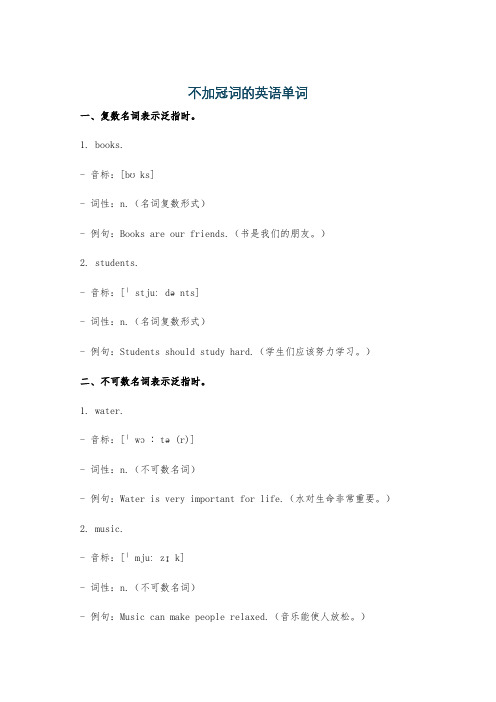
不加冠词的英语单词
一、复数名词表示泛指时。
1. books.
- 音标:[bʊks]
- 词性:n.(名词复数形式)
- 例句:Books are our friends.(书是我们的朋友。
)
2. students.
- 音标:[ˈstjuːdənts]
- 词性:n.(名词复数形式)
- 例句:Students should study hard.(学生们应该努力学习。
)
二、不可数名词表示泛指时。
1. water.
- 音标:[ˈwɔːtə(r)]
- 词性:n.(不可数名词)
- 例句:Water is very important for life.(水对生命非常重要。
)2. music.
- 音标:[ˈmjuːzɪk]
- 词性:n.(不可数名词)
- 例句:Music can make people relaxed.(音乐能使人放松。
)
三、三餐饭、球类运动等名词。
1. breakfast.
- 音标:[ˈbrekfəst]
- 词性:n.(不可数名词)
- 例句:I have breakfast at 7 o'clock.(我7点吃早饭。
)2. football.
- 音标:[ˈfʊtbɔːl]
- 词性:n.(可数名词,单数形式,但表示球类运动时不加冠词)- 例句:They like playing football.(他们喜欢踢足球。
)。
单数可数名词前何时不用冠词
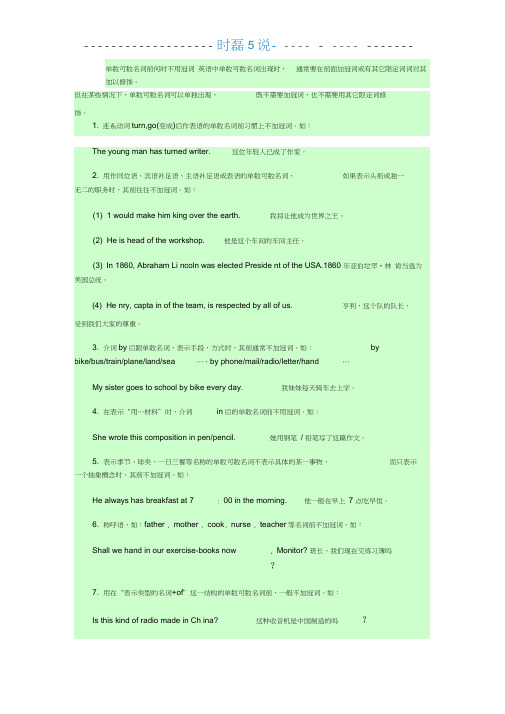
4.在表示“用…材料”时,介词in后的单数名词前不用冠词。如:
She wrote this composition in pen/pencil.她用钢笔/铅笔写了这篇作文。
5.表示季节、球类、一日三餐等名称的单数可数名词不表示具体的某一事物,而只表示
7.用在“表示类型的名词+of”这一结构的单数可数名词前,一般不加冠词。如:
Is this kind of radio made in Ch ina?这种收音机是中国制造的吗?
8.由介词或连词连接的的两个相同的、成对的或关系密切的单数可数名词前一般不加冠
词。如:year after year, side by side, step by step, year by year, arm in arm, hand in hand, face to face, shoulder to shoulder…
(4)He nry, capta in of the team, is respected by all of us.亨利,这个队的队长,
受到我们大家的尊重。
3.介词by后跟单数名词,表示手段、方式时,其前通常不加冠词。如:by
bike/bus/train/plane/land/sea…,by phone/mail/radio/letter/hand…
My father is in hospital.I must go to look after him.顾他。
11.当单数可数名词作表语又被enough,no,more than等修饰时,意义抽象化,通常
不加冠词。如:
(1)He is teacherenough to work out the problem.他学识渊博,足可以解出这道题。
英语中省略冠词的情况一览
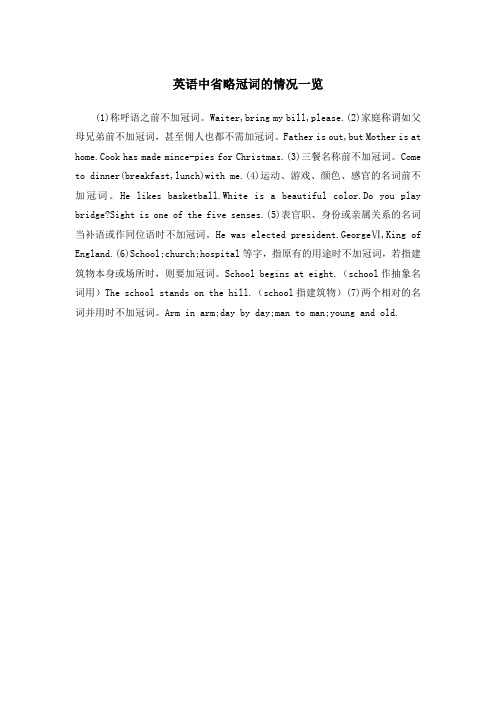
英语中省略冠词的情况一览
(1)称呼语之前不加冠词。
Waiter,bring my bill,please.(2)家庭称谓如父母兄弟前不加冠词,甚至佣人也都不需加冠词。
Father is out,but Mother is at home.Cook has made mince-pies for Christmas.(3)三餐名称前不加冠词。
Come to dinner(breakfast,lunch)with me.(4)运动、游戏、颜色、感官的名词前不加冠词。
He likes basketball.White is a beautiful color.Do you play bridge?Sight is one of the five senses.(5)表官职、身份或亲属关系的名词当补语或作同位语时不加冠词。
He was elected president.GeorgeⅥ,King of England.(6)School;church;hospital等字,指原有的用途时不加冠词,若指建筑物本身或场所时,则要加冠词。
School begins at eight.(school作抽象名词用)The school stands on the hill.(school指建筑物)(7)两个相对的名词并用时不加冠词。
Arm in arm;day by day;man to man;young and old.。
哪些情况下不用冠词a、an、the
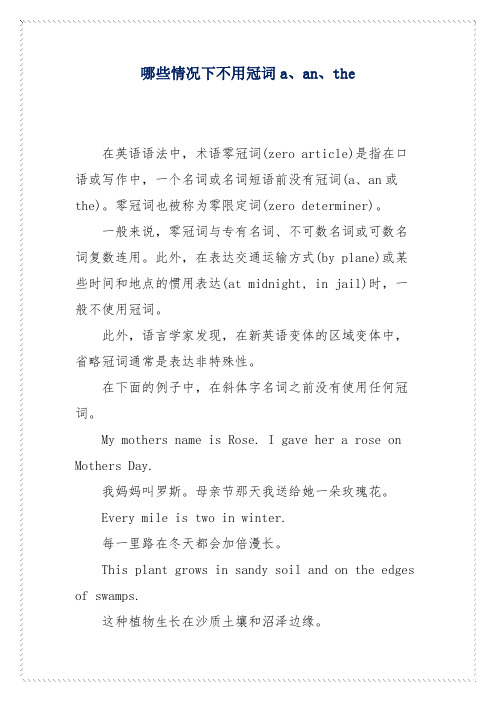
When Elizabeth was in hospital, she was occasionally visited by her parents.
[英式英语]伊丽莎白住院时,她的父母常常会去看望她。
零冠词与可数名词的复数和不可数名词
可数名词是可以有复数形式的名词,如狗或猫。在名词的复数形式中,可数名词前有时不加冠词,特别是一般名词。当名词是复数,但数量不确定时,同样不加冠词。
哪些情况下不用冠词a、an、the
在英语语法中,术语零冠词(zero article)是指在口语或写作中,一个名词或名词短语前没有冠词(a、an或the)。零冠词也被称为零限定词(zero determiner)。
一般来说,零冠词与专有名词、不可数名词或可数名词复数连用。此外,在表达交通运输方式(by plane)或某些时间和地点的惯用表达( midnight, in jail)时,一般不使用冠词。
Clean air is important for a healthy environment.
空气清洁对健康的环境是非常重要的。
The man was overcome by sadness when he lost his home.
那个人失去家的时候悲痛万分。
每一里路在冬天都会加倍漫长。
This plant grows in sandy soil and on the edges of swamps.
这种植物生长在沙质土壤和沼泽边缘。
David Rockefeller was authorized to hold the position of director of the Council on Foreign Relations.
名词前不加冠词the的情况整理课件

表示抽象概念或本质
当可数名词单数表示抽象的概念或事物的本质时,通常不 需要加冠词the。
例如,当我们提到“爱”,我们指的是一种情感或本质, 而不是特指某一种爱,因此前面不加冠词the。
05
不定代词
some, many, little, much等词
some/many+可数名词复数/不可数名词: 表示“一些/许多……”
情感
情感名词前不加定冠词the,表示泛指情感。
情感通常是指一种普遍的情感状态,而不是具体的情感体验。因此,在情感名词前通常不加定冠词 the,以表示泛指情感。例如,“快乐”、“悲伤”、“愤怒”等情感名词前都不加定冠词the。
03
物质名词
食物
食物作为物质名词时,通常不加冠词 the。
VS
食物是指供人类食用的物质,如米饭 、面包、蔬菜、肉类等。在英语中, 当食物作为物质名词时,通常不需要 加冠词the,如“I like eating pizza”中的“pizza”不需要加the 。
02
抽象名词
概念
抽象名词前不加定冠词the,表示泛指概念。
抽象名词通常表示一种普遍的概念或品质,而不是具体的事物。因此,在抽象名 词前通常不加定冠词the,以表示泛指概念。例如,“爱情”、“友谊”、“知 识”等抽象名词前都不加定冠词the。
品质
品质名词前不加定冠词the,表示泛指品质。
品质通常是指一种普遍的特性或特点,而不是具体的事物。因此,在品质名词前通常不加定冠词the,以表示泛指品质。例如 ,“勇敢”、“诚实”、“善良”等品质名词前都不加定冠词the。
04
可数名词单数
表示一类事物
01
当可数名词单数表示一个整体类 别时,通常不需要加冠词the。
- 1、下载文档前请自行甄别文档内容的完整性,平台不提供额外的编辑、内容补充、找答案等附加服务。
- 2、"仅部分预览"的文档,不可在线预览部分如存在完整性等问题,可反馈申请退款(可完整预览的文档不适用该条件!)。
- 3、如文档侵犯您的权益,请联系客服反馈,我们会尽快为您处理(人工客服工作时间:9:00-18:30)。
26. Tony wants to see Susan. 27. Christmas is a widely celebrated festival. 28. Europe is more advanced than Africa. 29. Do you know where Buckingham Palace is? 30. Is Japanese similiar to Chinese?
有关餐食的名词
10. Dinner is ready.
11. After lunch, you may take a nap.
12. What do you eat for breakfast?
有关四季的名词
13. I like autumn most.
14. Do you have to teach in summer?
英语中不需要冠词的名词
一则征聘广告的结尾这样写: “Suitable candidates will be offered a very
attractive terms which cannot be refused.” 这句话的意思,一目了然,可惜其中有个不该有的
语法错误;那就是“a very attractive terms”中的 “terms”是个复数名词,不需要有冠词,和不定冠词 “a”连用,更是不合语法规则。
15. Winter is over; will spring be far
away?
有关游戏和运动的名词
16. Fandi can play soccer very well. 17. Do yo like to play chess? 18. Is bridge a popular game here?
in history. 35. Tom showed a courage worthy of
special mention. 36. I find it hard to forget the generosity
with which David treated me.
32. We enjoy reading the great works written by the immortal Shakespeare.
33. A little knowledge is a dangerous thing. 34. The wisdom of Solomon was recorded
上述是无须冠词的例句,但当专有名词之前有修饰语时,可以用 定冠词(例(31)-(32));当抽象名词被形容词、短语或分句修饰时,也
可以有适当的冠词(例(33)-(36)):
31. Caesar was an ancient hero. Do you admire the great Caesar and his deeds?
有关疾病的名词
19. Old People tend to suffer from diabetes.
20. Many women are inflicted with rheumatism.
有关学科或带“-ism”后缀的名词
21. Mathematics and physics are difficult subjects.
为了避免同样的错误出现,现在试把不需要冠词的 场合做以总结
复数名词
1. Doctors cure patients. 2. Axes are tools for cutting wood. 3. Those people are teachers, not
students.
物质名词
4. Gold is precious.
22. Which do you prefer, imperialism or communism?
在“by + 交通工具”的片语里
23. Shall we walk or go by bus? 24. The tourists came by plane. 25. Do you like to travel by land or by
5. Air is indispensable to animals.
6. Electricity is a form of energy.
抽象名词
7. Unity is strength.
8. Knowledge is power.
9. Samson is a man of bravery.
